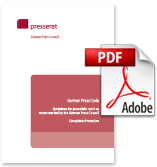We are the voluntary self-regulation of the German press.
The German Press Council is the body responsible for enforcing the voluntary self-regulation of the press in Germany. Through addressing complaints about press behaviour, we monitor compliance with the ethical rules for the daily work of journalists laid down in the German Press Code.
Inspired by the British Press Council of 1953, the journalist and publisher associations formed the German Press Council on November 20, 1956. The German PC is a non-profit association, an organ of the major associations of the press under private law.
The Press Council is responsible for preserving the reputation of the German press, while protecting its freedom. Furthermore, the Press Council champions the unimpeded access by journalists to news sources and ensures self-regulation with regard to editorial data protection and financial market reporting.
Structure and Organization
The Press Council is organised as a registered association under German law. This association is comprised of two publishing and two journalist organisations:
• Federation of German Newspaper Publishers (BDZV)
• German Federation of Journalists (DJV)
• German Journalists Union (dju) within the German United Trade Services Union (dju in ver.di)
• Association of German Magazine Publishers (VDZ)
The so called “Plenum” (plenary) of the German Press Council is its main body and consists of 28 members – each of the four organizations sending seven members to it.
There are three complaints committees elected from the 28-member plenary: two general complaints commissions with eight members each and one with six members for editorial data protection. All of the bodies of the German Press Council are staffed by publishers and journalists for a period of two years upon the proposal of the sponsor organisation. The chair of the bodies changes every two years among the four organisations.
German Press Code
German Press Code - rules for fair journalism
The guideline for the Press Council’s work is the Code of Ethics, published first in 1973 and updated since then on a regular basis. The rules for journalists' daily work ensure that professional ethics in journalism are maintained, for example:
- respect for the truth and maintaining human dignity
- thorough and fair research
- respect for the right to privacy, a private life and no intrusion
- avoidance of inappropiate sensational portrayals of violence and brutality
Who can complain?
Anyone can complain to the German Press Council – whether personally affected or not, whether private individual, association or party. We accepts complaints on all kinds of journalistic work that has been published in a newspaper, a magazine or on the internet. However the Press Council does not deal with free sheets or private homepages. Also the Press Council is not dealing with radio, television or advertisements.
The complaint is free of charge. The Press Council is not dealing with legal issues.
Sanctions
The Press Council may impose the following sanctions:
- public reprimand (with obligation to print this)
- non-public reprimand (in the interest of victims’ protection)
- notice of censure
- advice notice
Furthermore, the Complaints Committee can refrain from imposing a sanction in spite of a justified complaint if the publication has put the matter in order e.g. by printing a reader’s letter or an editorial correction.
Who finances the Press Council?
The work of the Press Council is financed from two sources: in the first place, the four organisations that make up the registered association pay contributions. In the second place, since 1976, the German Federal government has granted an annual subsidy specifically for the work of the Complaints Committee. The payment of this subsidy has its basis in a separate law.
The German Press Council is a member of the Alliance of Independent Press Councils in Europe AIPCE. We participate at the network's annual conferences and exchange media-ethical issues with each other throughout the year. Since 2019 we also participate at the common Project "Media Councils in the Digital Age" which is funded by the European Commission.
